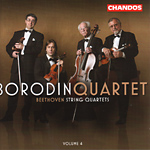The ensemble featured in these distinctly Slavic-toned Beethoven readings is not the Borodin Quartet of old, whose decades-old Melodiya recordings showcased the group’s trademark ferocious temperament and steely virtuosity. Instead, the current band (including new and original members) offers large-scaled, warm-hearted performances of the type that some aging Russian conductors (most notably Evgeny Svetlanov) have produced of late.
I’m thinking particularly of the coda of Op. 127’s finale. In contrast, the Emerson Quartet’s hyper-speed creates an aura of unattainable perfection as well as emotional distance, while the Borodin’s slower yet no less virtuosic rendition keeps you aware of four living, breathing people. It’s this element that makes it easier to maintain concentration throughout the long theme and variations, one of many late-Beethoven movements that test a listener’s patience through its “heavenly lengths”.
These same interpretive choices make Op. 130 sound remarkably fresh. The musicians have no agenda, save for playing the music with as much heart and soul as they can muster. In the scherzo, rhythms are acute and energized (if not exhibiting the razor’s edge exactitude of the Emerson or Berg Quartets), while the Cavatina’s melody fairly soars, leaving no doubt about the Borodin’s involvement or enthusiasm.
Given this precedent, it’s only fitting that the ensemble would choose Beethoven’s sunnier, gentler replacement finale over the lurching rhythms and grinding dissonances of the Grosse Fuge. Even here, though, the Borodin offers much depth of feeling–and is it only coincidental that the relationship between Beethoven’s secondary theme and the main theme of Borodin’s String Quartet No. 1 sounds especially acute in this performance? Chandos’ recording preserves an intimate environment while conveying the full sonic range and dynamism of the performances. Perhaps it’s not cutting-edge Beethoven, but the listening is never less than pleasurable.
































